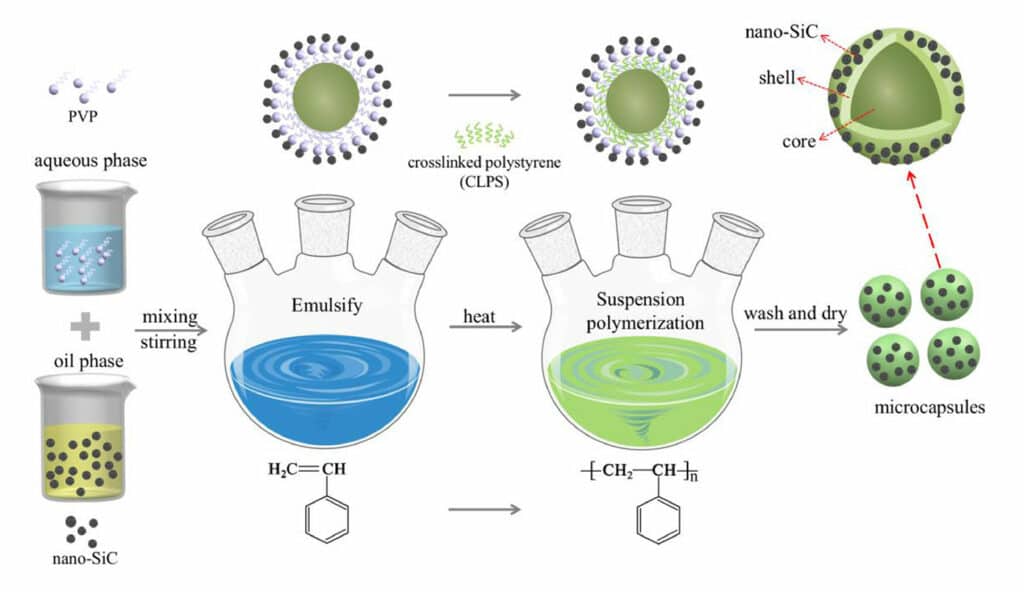The widespread usage of fossil fuels is attributed significantly to environmental issues such as air pollution and global warming. Emissions from coal, natural gas, and petroleum-based fuel are major contributors to the climate crisis. Utilizing renewable energy sources – such as abundant and eco-friendly solar energy – and developing energy-efficient technologies can reduce our reliance on fossil fuels.
Since solar energy is distributed unevenly in the world, developing effective photothermal conversion materials capable of collecting solar energy and converting it directly into usable energy is critical. In this regard, phase change materials (PCMs) are a popular candidate as solar energy storage devices. PCMs can store a tremendous amount of energy and can release/absorb sufficient energy at phase transition to provide useful heating/cooling.
However, practical PCMs suffer from leakage and corrosion issues and also show poor heat transfer properties due to low thermal conductivity. While this can be solved by using metal PCMs, it makes the PCMs costlier and bulkier.
Studies have shown encapsulating the PCMs in microcapsules with high-conductivity fillers, such as nanoparticles, could solve these issues. This can protect them from the damaging effects of light, heat, moisture, and oxygen, as well as improve their heat transfer properties.
In a recent breakthrough, researchers from China and USA synthesized PMC microcapsules by using n-Octadecane (ODE) as the PCM core and silicon carbide (SiC) nanoparticle-doped crosslinked polystyrene (CLPS) as the outer shell.

“Phase change microcapsule materials have been the focus of our research. In a previous study, we found that a single organic shell has defects in thermal conductivity and stability, while a single inorganic shell is not satisfactory in compactness and coverage. Therefore, we began to focus on doping organic shells with inorganic nanoparticles to obtain organic-inorganic hybrid shells,” explains Prof. Jifen Wang from Shanghai Polytechnic University, China, one of the authors of the study.
In their study, the team prepared a series of four microcapsules using suspension polymerization. SiC nanoparticles were employed to modify the shell to improve the heat transfer and photothermal conversion of the microcapsules. They then characterized the microcapsules using scanning electron microscopy, energy-dispersive X-ray spectroscopy, and Fourier transforms infrared spectroscopy. The results indicated that the microcapsules were spherical, and the nano-SiC particles were embedded in the CLPS shells, aiding the heat transfer and photothermal conversion efficiency of the microcapsules.
Researchers then tested the thermal properties of the microcapsules and found that they showed superior photothermal conversion and thermal conductivity compared to the non-doped samples. Among the four types of doped microcapsules, the one with 1.25 wt% nano-SiC doping demonstrated the best performance, with a 54.9% photothermal conversion efficiency, a whopping 146% higher than its non-doped counterpart.
The study opens new doors to the practical application of multifunctional phase change microcapsules. “These microcapsules can have significant potential applications as energy storage materials in solar energy devices, intelligent thermal insulation equipment, and energy-saving buildings,” says Prof. Wang.
It could provide a solid framework for further research on energy materials with excellent solar energy storage and conversion efficiency.
Journal reference:
- Kuan Zhao, Jifen Wang, Huaqing Xie, and Zhixiong Guo. Enhanced photothermal conversion and thermal conductivity of phase change n-Octadecane microcapsules shelled with nano-SiC doped crosslinked polystyrene. Energy Storage and Saving, 2022; DOI: 10.1016/j.enss.2022.09.003
New efficient phase change microcapsules for storing solar energy
Source: Tambay News

0 Comments